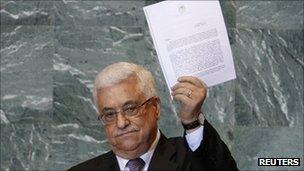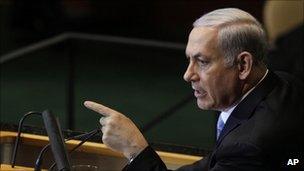Mid-East crisis: Abbas vs Netanyahu at UN
- Published

Mr Abbas said Palestinians were waiting to hear the world's answer
The debate over a Palestinian bid for UN membership reached a peak on Friday with the Palestinian and Israeli leaders appealing to the 193 nations that make up the General Assembly.
The issue has dominated this year's gathering of world leaders, who crowded into the hall to hear the two men argue their case, writes the BBC's Barbara Plett in New York.
It was clear for which one the audience had greater sympathy.
Scores of envoys leaped to their feet applauding when Palestinian leader Mahmoud Abbas brandished a letter of application he had submitted to UN Secretary General Ban Ki-moon, requesting that Palestine be accepted as a UN member state.
Mr Abbas embedded his speech in history. He recounted the gradual acceptance by the Palestine Liberation Organisation (PLO) of a two-state solution to the conflict with Israel and the frustration with the peace process as the way to achieve that goal.
The PLO's decision in 1988 to relinquish its claim on all of Mandate Palestine and settle for those territories captured by Israel in 1967 was a "very painful and difficult step" said Mr Abbas, but "we decided to adopt the path of relative justice, justice that is possible".
'No business as usual'

Benjamin Netanyahu countered Mahmoud Abbas with characteristic combativeness
Now, after 20 years of fruitless negotiations, he said, the Palestinians have concluded that the path to independence is firmly blocked.
With passion, he blamed Israel's "colonial" policy of building Jewish settlements on occupied territory which, he said, was undermining the realistic potential for the existence of a Palestinian state.
Mr Abbas also implied he had no more faith in the American-led process based on the Oslo peace accords, appealing for a greater and more effective UN role.
"It is no longer possible to redress the issue of the blockage of the horizon of the peace talks with the same means and methods… that have proven unsuccessful," he said.
"It is neither possible nor practical to return to conducting business as usual."
And for the first time he warned that the Palestinian Authority could collapse if Israel continued expanding settlements.
"I caution aloud," he said, repeating the phrase for emphasis.
'Useless' proposals
Israeli Prime Minister Benjamin Netanyahu countered Mr Abbas with characteristic combativeness, but was rewarded with sparse and often partisan applause.
He framed his speech with Israel's security needs, painting a picture of a growing threat from militant Islam in the region and in the Palestinian Gaza Strip, which is governed by the Islamist Hamas movement.
He dismissed the contention that an Israeli withdrawal from occupied territory would bring peace, saying the opposite had happened when Israel left Gaza.
"The moderates didn't defeat the radicals, the moderates were devoured by the radicals… we didn't get peace, we got war," he said, referring to Hamas rocket attacks on Israel.
Mr Netanyahu told the assembly he needed to ensure the same thing wouldn't happen in the West Bank, which is located closer to major Israeli cities. For that, security arrangements had to be negotiated with the Palestinians, he said, and this must come before they got their state.
The Israeli premier maintained that Mr Abbas had failed to respond to numerous overtures of peace, challenging him again to meet that day in New York, but rejecting the heart of his argument: the core of the conflict is not settlements, he said, but the "refusal of the Palestinians to recognise a Jewish state in any border".
The Palestinians may have won the popular vote in the General Assembly, but the Israelis will win the battle over UN membership.
The Americans have made it absolutely clear they will veto the move in the Security Council, describing "defending Israel" as one of their achievements at the UN in a White House fact sheet.
Hoping to avoid a US veto, the Quartet of Middle East mediators (the UN, Russia, European Union, and America) has issued a proposed framework for reviving peace talks.
But it doesn't explicitly mention settlements or even confirm the 1967 lines as the basis for border negotiations - the two conditions on which Palestinians insist.
With Palestinian officials describing the statement as "useless" and "worthless," and the White House focused on appeasing a pro-Israeli congress ahead of presidential elections, the question of Palestine may continue to return to the UN in the coming months.